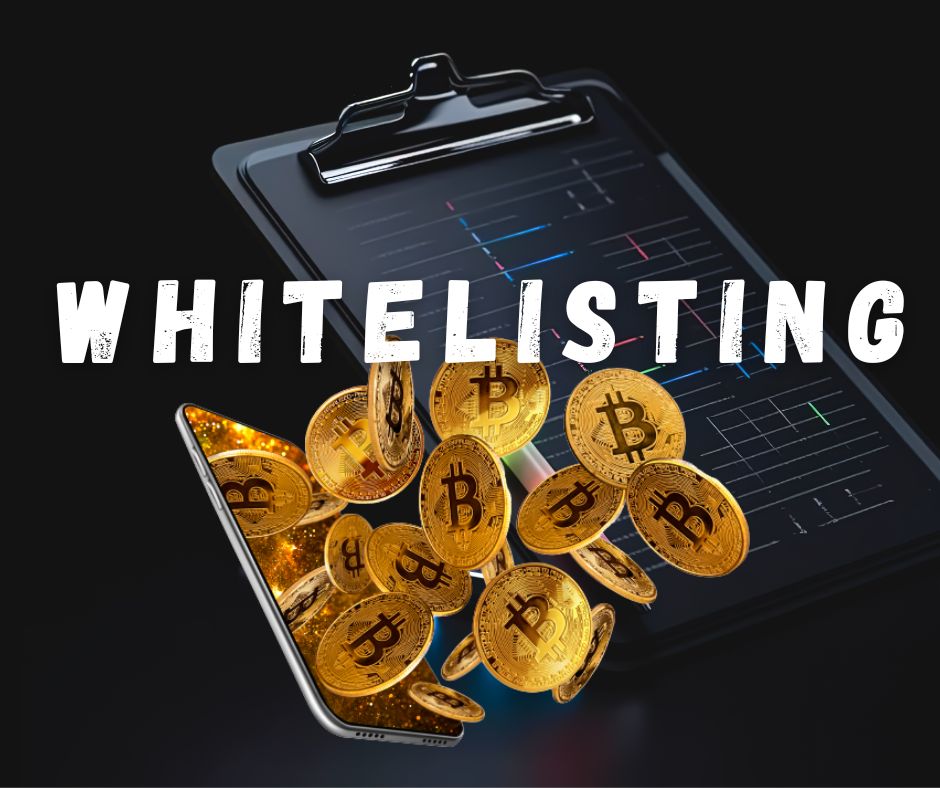Picture a bustling marketplace, buzzing with opportunities and potential investments. Now, imagine you’re handed an exclusive pass that grants you early access to the best offerings, even before the general crowd gains entry. That’s the power of being on a whitelist in the cryptocurrency world. While in everyday parlance ‘whitelist’ often stands in contrast to ‘blacklist’, in the crypto realm it represents a privilege, an affirmation of your ability to participate in select, high-stake events. Whitelisting in crypto is not just about access; it’s a signal of trust, reliability, and exclusivity: an essential concept that every blockchain enthusiast should understand.
Unveiling the Crypto Whitelist Meaning
The crypto whitelist, at its core, is an approved list of participants for specific cryptocurrency events. It may include Initial Coin Offerings (ICOs), Initial Exchange Offerings (IEOs), or even launches of Non-Fungible Tokens (NFTs). The idea behind the whitelist is simple: it’s a form of vetting process where only those who meet the criteria set by the event organizers are allowed to participate.
To unravel this further, think of a VIP guest list at a high-profile event. Just as the attendees on that list have to meet certain criteria to gain entry, so do the individuals on a crypto whitelist. These criteria can range from a minimum investment amount to maintaining an account in good standing, and sometimes, even to having a special invitation or referral code. Hence, being on a whitelist means that you’ve been pre-approved and are ready to take part in the designated event.
The Purpose and Advantages of Being Whitelisted in Crypto
Being whitelisted in the cryptocurrency world is akin to having a fast pass at an amusement park. It takes you straight to the front of the queue, granting priority access to specific events or transactions. This advantage is particularly appealing to investors eyeing token purchases in ICOs or IEOs before they become available to the general public. It allows them to get in on the ground floor of potential investment opportunities.
Moreover, the benefits of being whitelisted don’t end at priority access. Whitelisted investors often enjoy unique perks such as discounted pricing, larger token allocations, or even stability in gas fees during network congestion. It’s like having an all-access pass with added benefits!
On the security front, whitelisting also extends to crypto withdrawal addresses. This means users can create a list of trusted addresses from which they can withdraw their assets, thereby adding an extra layer of security. This protective feature helps to shield users from fraudulent transactions, providing them with more control over their assets.
All in all, the concept of whitelisting injects a sense of order, exclusivity, and enhanced security into the often volatile and unpredictable landscape of cryptocurrency trading.
The Whitelist Procedure: A Deep Dive
Now that we’ve established the value of being whitelisted, the question arises, “How does one actually get onto a whitelist?” The process typically starts with the project organizers announcing a whitelisting event. This could be for an ICO, an IEO, or an upcoming NFT launch.
Potential participants are required to register their interest and provide pertinent details such as name, email address, and sometimes even more in-depth KYC (Know Your Customer) information. After this initial sign-up, the organizers review each application, ensuring that they align with their defined criteria. These might encompass factors like a history of trustworthy trading, a referral code, or a minimum deposit requirement.
Once approved, participants are officially ‘whitelisted’ and often receive an email or notification, confirming their successful inclusion. This process aims to curate a pool of reliable and committed participants, making the ensuing event more secure and potentially more successful.
The Impact of Whitelisting in Initial Coin Offerings (ICOs)
Whitelisting plays an especially significant role in the context of ICOs. For the uninitiated, an ICO (Initial Coin Offering) is a type of crowdfunding, used by startups to raise capital. In exchange for their investment, participants receive a new cryptocurrency token specific to the project.
Imagine an ICO as a high-profile concert. Without an orderly system, there would be a rush towards purchasing the limited tickets, possibly leading to server issues, scalping, and discontentment among the potential attendees. The ‘whitelisting’ process brings order to this chaos. It ensures that only pre-approved, genuine enthusiasts have the opportunity to participate in the ICO, avoiding a mad, uncontrolled rush and ensuring a fair distribution of tokens.
Not only does this bring a level of credibility and security to the ICO process, but it also affords investors the chance to secure tokens at potentially lower prices before the public sale. Hence, whitelisting can contribute significantly to an ICO’s success, making it a critical aspect of the crypto investing landscape.
Whitelist Crypto Meaning in Withdrawal Addresses
While the concept of whitelisting is vital in ICOs and similar events, it also finds extensive application in securing crypto withdrawal addresses. This essentially means that you can create a list of ‘trusted’ addresses from which you can withdraw your crypto assets.
Think of it as a VIP list of your most trusted friends. Only people on this list (or, in this case, addresses) can receive your funds, providing an additional layer of security to your crypto transactions. This feature helps users protect their assets from hacking attempts, adding a robust security layer to your transactions.
It’s like a bouncer at a nightclub only allowing access to those on the VIP list. Similarly, when whitelisting is in place, transactions can only take place with addresses you’ve approved, keeping your assets safe from unwanted withdrawals. This application of whitelisting underlines its crucial role in safeguarding assets in the dynamic world of cryptocurrencies.
What is a Whitelist in the NFT Market?
Just like in the ICO space, whitelisting projects in crypto have become increasingly prevalent in the NFT (Non-Fungible Token) market. But what does being whitelisted mean in this context?
In the NFT world, a whitelist is a list of approved participants who get exclusive access to purchase or trade specific NFTs, often before they become available to the public. This might be for an upcoming NFT drop, an exclusive sale event, or even a new NFT project. Being whitelisted often grants participants early access, potentially lower prices, and a guaranteed opportunity to participate, which is a significant advantage considering the skyrocketing demand for popular NFTs.
How to Get Whitelisted for NFTs?
So, you’re intrigued by NFTs and want to know how to get whitelisted? Here’s how.
Many NFT projects grant whitelist access to active and engaged community members. This could mean participating in discussions on the project’s Discord server, promoting the project on social media, or even contributing directly to the project in some form.
In some cases, you might be required to complete specific tasks, like solving puzzles or participating in competitions. Additionally, simply reaching out to the project organizers or community managers and expressing interest can sometimes help you get whitelisted.
However, keep in mind that every NFT project has its own unique criteria for whitelisting, so be sure to research and understand what’s required for each project you’re interested in. Being whitelisted for an NFT project can provide significant advantages, so it’s worth the effort to engage actively with the communities of projects you’re passionate about.
The Bottom Line
In the rapidly expanding world of cryptocurrencies and NFTs, the concept of a ‘whitelist’ has become a crucial feature. It’s an access gateway, a security measure, and a tool for community engagement all wrapped into one. Understanding the ins and outs of whitelisting is pivotal for anyone looking to dive into initial coin offerings, NFT sales, or secure crypto transactions.
Being whitelisted in the crypto world often implies that you’re ahead of the pack, equipped with advantages like early access, exclusive deals, enhanced security, and more. Whether it’s an upcoming ICO, a hot NFT drop, or a secure withdrawal address, being on the whitelist is the key to unlocking these opportunities.
As the crypto space continues to evolve, the value and application of whitelisting are likely to expand, reinforcing its crucial role in the world of digital assets.
It’s clear that if you’re serious about making the most of the opportunities in this space, understanding and engaging with the concept of ‘whitelisting’ is not just beneficial – it’s essential.









